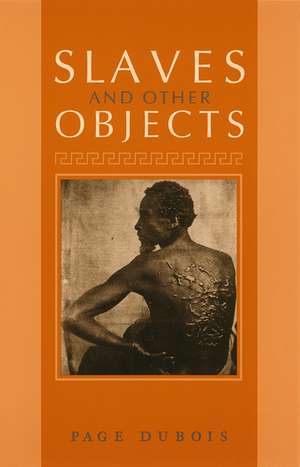Slaves and Other Objects
Autor Page DuBoisen Limba Engleză Paperback – 15 mar 2008
Page duBois, a classicist known for her daring and originality, turns in this new book to one of the most troubling subjects in the study of antiquity: the indispensability of slaves in ancient Greece. DuBois argues that every object and text in the world of ancient Greece bears the marks of slavery and the need to reiterate the distinction between slave and free. And yet the ubiquity of slaves in ancient societies has been overlooked by scholars who idealize antiquity, misconstrued by those who view slavery through the lens of race, and obscured by the split between historical and philological approaches to the classics.
DuBois begins her study by exploring the material culture of slavery, including how most museum exhibits erase the presence of slaves in the classical world. Shifting her focus to literature, she considers the place of slaves in Plato's Meno, Aristotle's Politics, Aesop's Fables, Aristophanes' Wasps, and Euripides' Orestes. She contends throughout that portraying the difference between slave and free as natural was pivotal to Greek concepts of selfhood and political freedom, and that scholars who idealize such concepts too often fail to recognize the role that slavery played in their articulation.
Opening new lines of inquiry into ancient culture, Slaves and Other Objects will enlighten classicists and historians alike.
DuBois begins her study by exploring the material culture of slavery, including how most museum exhibits erase the presence of slaves in the classical world. Shifting her focus to literature, she considers the place of slaves in Plato's Meno, Aristotle's Politics, Aesop's Fables, Aristophanes' Wasps, and Euripides' Orestes. She contends throughout that portraying the difference between slave and free as natural was pivotal to Greek concepts of selfhood and political freedom, and that scholars who idealize such concepts too often fail to recognize the role that slavery played in their articulation.
Opening new lines of inquiry into ancient culture, Slaves and Other Objects will enlighten classicists and historians alike.
Preț: 276.35 lei
Nou
Puncte Express: 415
Preț estimativ în valută:
52.89€ • 54.63$ • 44.01£
52.89€ • 54.63$ • 44.01£
Carte tipărită la comandă
Livrare economică 25 martie-08 aprilie
Preluare comenzi: 021 569.72.76
Specificații
ISBN-13: 9780226167893
ISBN-10: 0226167895
Pagini: 312
Ilustrații: 24 halftones
Dimensiuni: 152 x 229 x 18 mm
Greutate: 0.43 kg
Editura: University of Chicago Press
Colecția University of Chicago Press
ISBN-10: 0226167895
Pagini: 312
Ilustrații: 24 halftones
Dimensiuni: 152 x 229 x 18 mm
Greutate: 0.43 kg
Editura: University of Chicago Press
Colecția University of Chicago Press
Notă biografică
Page duBois is professor of classics and comparative literature at the University of California at San Diego. She is the author of six previous books, including, most recently Sappho Is Burning, published by the University of Chicago Press, and Trojan Horses: Saving the Classics from Conservatives.
Cuprins
List of Illustrations
Preface
Acknowledgments
Introduction
I. OBJECTS
1. Communicating with the Dead
Slaves and Everyday Life
2. Greeks in the Museum
3. Dildos
4. The Slave Body
II. TEXTS
5. Slavery as Metaphor, Slavery and Freedom
6. The Woman Enslaved
7. The Slave Plato
8. Aesop the Fabulist
9. On Aristotle
Or, The Political Theory of Possessive Mastery
10. Irate Greek Masters and Their Slaves
The Politics of Anger
Epilogue
Material World
Notes
Bibliography
Index
Preface
Acknowledgments
Introduction
I. OBJECTS
1. Communicating with the Dead
Slaves and Everyday Life
2. Greeks in the Museum
3. Dildos
4. The Slave Body
II. TEXTS
5. Slavery as Metaphor, Slavery and Freedom
6. The Woman Enslaved
7. The Slave Plato
8. Aesop the Fabulist
9. On Aristotle
Or, The Political Theory of Possessive Mastery
10. Irate Greek Masters and Their Slaves
The Politics of Anger
Epilogue
Material World
Notes
Bibliography
Index
